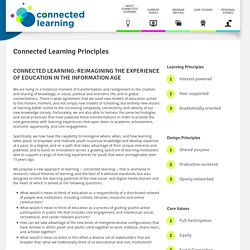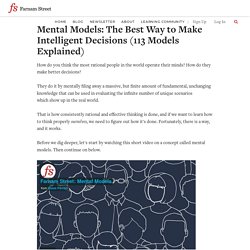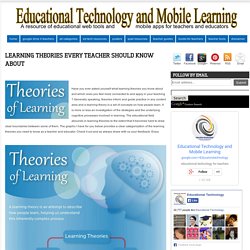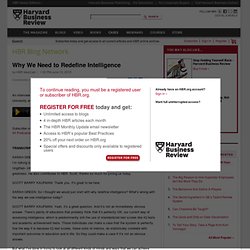

Do Not Follow Your Passion, Cultivate It. Connected Learning Principles. We are living in a historical moment of transformation and realignment in the creation and sharing of knowledge, in social, political and economic life, and in global connectedness.

There is wide agreement that we need new models of education suited to this historic moment, and not simply new models of schooling, but entirely new visions of learning better suited to the increasing complexity, connectivity, and velocity of our new knowledge society. Fortunately, we are also able to harness the same technologies and social processes that have powered these transformations in order to provide the next generation with learning experiences that open doors to academic achievement, economic opportunity, and civic engagement. What would it mean to think of education as a responsibility of a distributed network of people and institutions, including schools, libraries, museums and online communities? At the core of connected learning are three values:
Aspen Task Force on Learning and the Internet. Mental Models and Bias. Mental Models. How do you think the most rational people in the world operate their minds?

How do they make better decisions? They do it by mentally filing away a massive, but finite amount of fundamental, unchanging knowledge that can be used in evaluating the infinite number of unique scenarios which show up in the real world. That is how consistently rational and effective thinking is done, and if we want to learn how to think properly ourselves, we need to figure out how it's done. Fortunately, there is a way, and it works. Before we dig deeper, let's start by watching this short video on a concept called mental models. It's not that complicated, right? The idea for building a “latticework” of mental models comes from Charlie Munger, Vice Chairman of Berkshire Hathaway and one of the finest thinkers in the world.
Munger's system is akin to “cross-training for the mind.” In a famous speech in the 1990s, Munger explained his novel approach to gaining practical wisdom: Building the Latticework 1. 2. 3. 4. Obvious to you. Amazing to others. - by Derek Sivers. Learning Theories Every Teacher should Know about. Have you ever asked yourself what learning theories you know about and which ones you feel more connected to and apply in your teaching ?

Generally speaking, theories inform and guide practice in any content area and a learning theory is a set of concepts on how people learn. It is more or less an investigation of the strategies and the underlying cognitive processes involved in learning. The educational field abounds in learning theories to the extent that it becomes hard to draw clear boundaries between some of them. The graphic I have for you below provides a clear categorization of the learning theories you need to know as a teacher and educator. Check it out and as always share with us your feedback. Courtesy of edudemic.
Why We Need to Redefine Intelligence - HBR IdeaCast. An interview with Scott Barry Kaufman adjunct assistant professor of psychology at New York University and author of Ungifted: Intelligence Redefined.

Download this podcast SARAH GREEN: Welcome to the HBR IdeaCast from Harvard Business Review. I’m Sarah Green. I’m talking today with Scott Barry Kaufman. He’s on the faculty at NYU. SCOTT BARRY KAUFMAN: Thank you. SARAH GREEN: So I thought we would just start with why redefine intelligence? SCOTT BARRY KAUFMAN: Yeah, it’s a great question. But what I’ve done in trying to look at all different kinds of minds and ways that we can achieve success in the real world once we get out of school, and the importance of things such as inspiration, and motivation, and engagement in something that personally interests you– what I started to notice was a repeating pattern over and over again. It’s almost like there’s a lot of intellectual capacity hidden in a lot of people. SCOTT BARRY KAUFMAN: I absolutely will. And clearly they were wrong in the end. Re-imagining school.